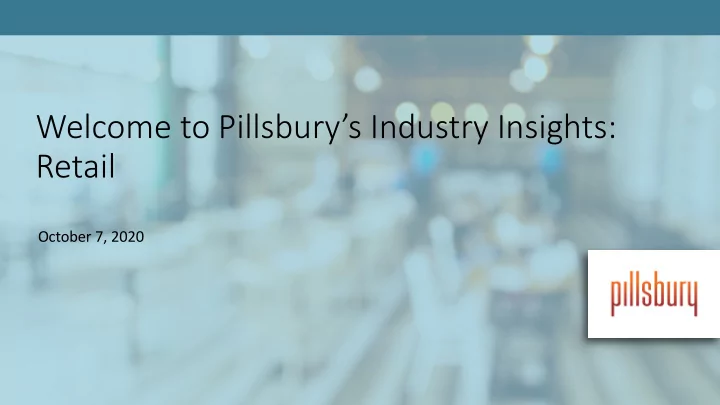

Welcome to Pillsbury’s Industry Insights: Retail October 7, 2020
Laura Latham Senior Counsel Paula Weber Partner
Paula Weber Partner
Agenda • Wage-Hour Risks in the COVID Era • Paid Sick Leave & FFCRA • Workplace & Customer Safety • EEO Considerations 3 | Welcome to Pillsbury’s Industry Insights: Retail
Wage & Hour Issues – California Peculiarities • Extraterritorial Application of California Labor Code o United Airlines & Delta Airlines cases • Contingent Scheduling (Tilly’s) • “De Minimis” Work/Security Checks (Apple) 4 | Welcome to Pillsbury’s Industry Insights: Retail
Wage & Hour Issues – California Peculiarities (cont’d) • Unlimited vacation policies (McPherson) • Release of PAGA claims (Reins) 5 | Welcome to Pillsbury’s Industry Insights: Retail
Paid Sick Leave Patchwork • FFCRA • Pre-COVID State and Local PSL • State and Local Emergency PSL and FFCRA “gap-fillers” • Existing Employer Policies and Practices • PSL laws may require payment, but some laws do not permit forced use of PSL by employer 6 | Welcome to Pillsbury’s Industry Insights: Retail
Families First Coronavirus Response Act (“FFCRA”) • Federal statute imposing paid leave obligations on employers • Applies to employers with fewer than 500 U.S. employees • In effect April 1, 2020 – December 31, 2020 • Sets the floor for statutory leave entitlement • Substantial penalties for noncompliance • Two Entitlements to Paid Leave Under the Act: (1) Emergency Paid Sick Leave Act (EPSL) (2) Emergency Family and Medical Leave Expansion Act (EFMLEA) 7 | Welcome to Pillsbury’s Industry Insights: Retail
Expansion of CFRA – Effective 1/1/21 • Covers employers with 5 or more employees • Covers leave to care for grandparents, grandchildren and siblings • No exception for reinstatement of key employees • If employer and employee both mother and father must give them 12 weeks for baby bonding 8 | Welcome to Pillsbury’s Industry Insights: Retail
Laura Latham Senior Counsel
Workplace & Customer Safety • Follow CDC/OSHA guidance and state/local resources o Many require opening plans/postings o Some require prescreening of employees; density limitations • Adopt/enforce regular handwashing and personal hygiene • Review and modify access, layouts, equipment, barriers signage and point-of-sale protocols • Develop checklist or action plan for handling symptomatic employees in the workplace and communications protocols 10 | Welcome to Pillsbury’s Industry Insights: Retail
Workplace Safety: Sick Employees • Ill or symptomatic employees should be required to tell employer ASAP • Send the worker home -- until tested and cleared, or isolation time has passed • Deep clean if they came to work (closing to the public if necessary) • Notify co-workers who had direct contact with employee and advise of signs of the virus • Consider whether other employees need to be sent home as well to self-quarantine • Raises PR and communications issues; best practice is to develop communications and protocols now 11 | Welcome to Pillsbury’s Industry Insights: Retail
Beware of Enhanced State Safety Protections E.g., Recent California Legislation: • AB 685 [Public Health Notice] o Requires public and private California employers to provide detailed notices to employees when there • is a COVID-19 exposure in the workplace, and to provide notice to local public health departments for COVID-19 “outbreaks” SB 1159 [Workers’ Compensation Presumption] o Extends prior Executive Order • California workers who contract COVID-19 are presumed to have a workplace injury covered by the • workers’ compensation system. Establishes a “rebuttable presumption” for COVID-19 claims for certain first responders (police and • fire) and specified health care workers. For all other employers, SB 1159 creates a “rebuttable presumption” for workers’ compensation for • COVID-19 for “outbreaks” Similarly, Virginia has adopted regulations requiring employers to notify employees, the Virginia Department of • Public Health, the building owner, and others of possible workplace exposure within 24 hours of learning of the exposure to a known case. 12 | Welcome to Pillsbury’s Industry Insights: Retail
EEO Risks • Federal and State EEO laws not suspended in COVID-19 era o Heightened concerns re ADA (disability discrimination) o Heightened risks of age and national origin discrimination • ADA medical confidentiality rules still apply • Employer rights for medical exams are broadened in a pandemic 13 | Welcome to Pillsbury’s Industry Insights: Retail
Potential EEO Claims by Employees Offered Work • Employees with chronic health conditions entitled to accommodations due to heightened risk • Leave beyond FFCRA may be a reasonable accommodation • But also consider how to deal with employees who want to return to work despite being high risk • Potential gender discrimination issues as related to childcare responsibilities 14 | Welcome to Pillsbury’s Industry Insights: Retail
EEO & WARN Issues • WARN planning required if new Furloughs/Layoffs considered o WARN issues if longer than 6 months or turning furloughs into layoffs • Returning Workers on Furlough/Layoff o Risk of discrimination/retaliation claims based on selection o CBA’s/ local ordinances requiring bringing back by seniority (e.g. LA) 15 | Welcome to Pillsbury’s Industry Insights: Retail
Laura Latham Senior Counsel Paula Weber Partner
Recommend
More recommend